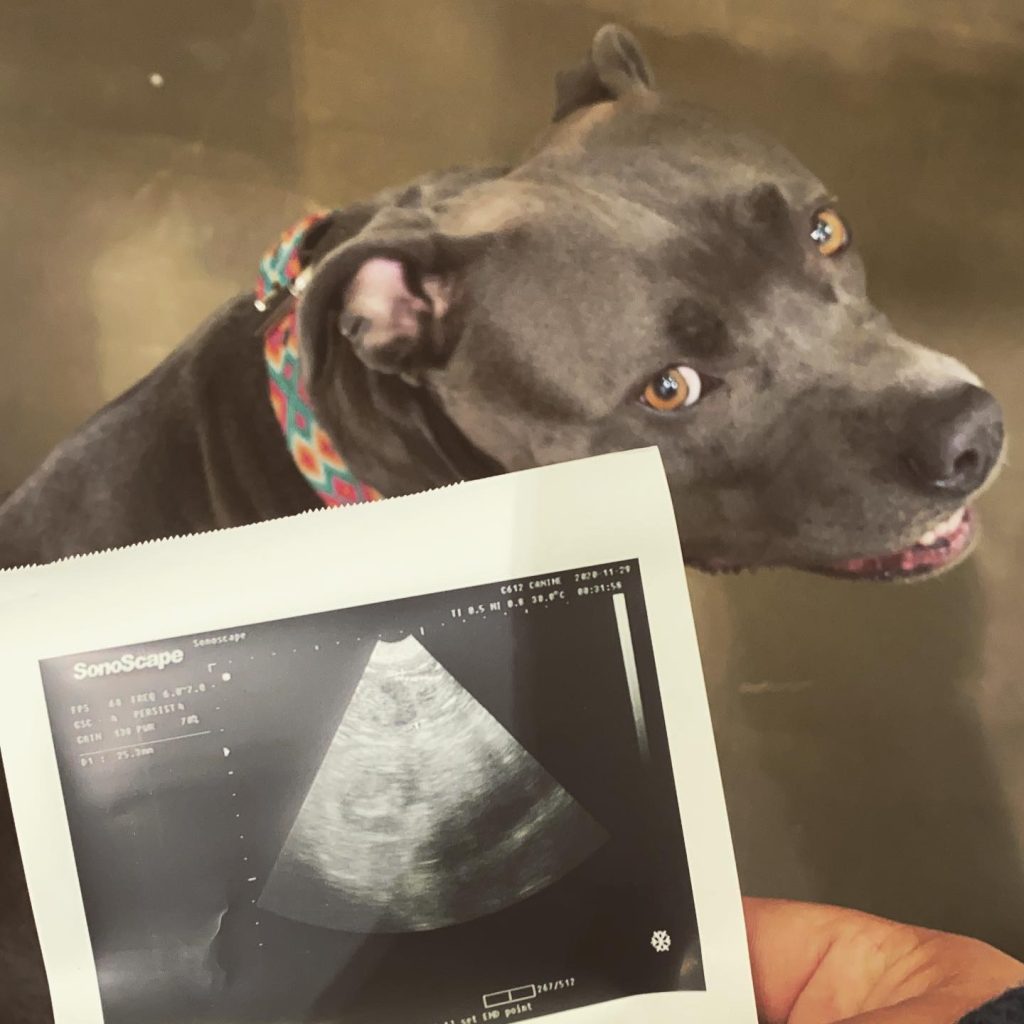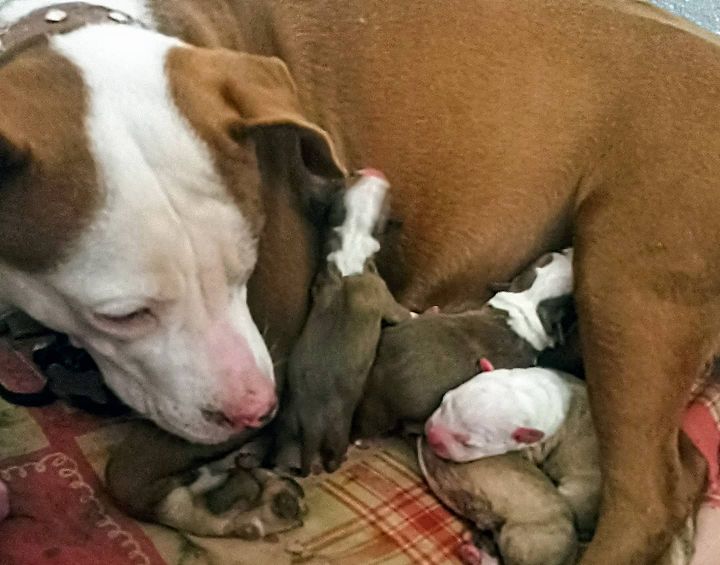Understanding the reproductive cycle and pregnancy stages of pit bulls is essential for any owner planning to breed or care for a pregnant pit bull dog. This guide will help you learn about everything from the appropriate age for pregnancy to caring for your pit bull during her pregnancy and the birthing process. Knowing what to expect can lead to a healthy pregnancy and a safe delivery for your pit bull and her pups.
What’s the Appropriate Age for Your Pit Bull to Get Pregnant?
Before breeding your pit bull, it’s crucial to consider her age and overall health. Generally, female pit bulls reach sexual maturity between six to twelve months of age, though this can vary slightly depending on the individual. While pit bulls can technically become pregnant after their first heat cycle, it’s usually recommended to wait until they’re at least two years old to ensure they’re fully grown and physically mature enough to handle the demands of pregnancy and childbirth.
Waiting until your pit bull is mature before breeding has multiple benefits:
- Ensures she has reached full physical development.
- Reduces the risk of complications during pregnancy.
- Allows time to check for any hereditary health issues that could be passed to her puppies.
Veterinarians can help assess when your pit bull is mature and healthy enough for pregnancy, which is crucial for both her safety and that of her future pups.

The Signs of Pregnancy in Pit Bull Breeds
Recognizing the signs of pregnancy in pit bulls is important, especially if it was an unplanned event. Some common signs that your pit bull may be pregnant include:
- Changes in Appetite: Initially, she may eat less or appear more selective, but as her pregnancy progresses, her appetite should increase significantly.
- Weight Gain and Enlarged Abdomen: As her body prepares to carry and nurture a litter, you’ll notice her abdomen expanding.
- Nipple Growth and Darkening: Her nipples may become larger, darker, and more prominent.
- Increased Affection or Changes in Temperament: Pregnant pit bulls may become more affectionate or seek solitude at times. Some may exhibit slight mood swings.
- Decreased Energy Levels: You may notice that your normally energetic pit bull is more sluggish or less eager to play and exercise.
Along with these general signs, it’s possible to confirm pregnancy early on with veterinary help.
Awilda Rodriguez, DVM
From my experience, the earliest signs of pregnancy in pit bulls are usually subtle but noticeable if you know what to look for. I’ve found that around two to three weeks after mating, many pit bulls show slight behavioral changes, like becoming a bit more affectionate or, in some cases, a bit reserved. A useful tactic I use in my practice is recommending a blood test for relaxin, which can detect pregnancy as early as 21 days post-mating. This test has been highly reliable, helping owners confirm pregnancy early so they can start the right care from the start, which can lead to healthier, stronger litters.
These signs might be subtle at first, but as her pregnancy progresses, they’ll become more pronounced. However, because some of these symptoms can also indicate health issues, it’s wise to consult a veterinarian if you suspect pregnancy.
table of content ↑How Can You Confirm Your Pit Bull’s Pregnancy?
If your pit bull shows signs of pregnancy, the best way to confirm it is by visiting a veterinarian. There are several methods to accurately determine if she’s pregnant:
- Ultrasound: Ultrasounds are effective from about 25 to 30 days after mating and can show the presence of fetal heartbeats, confirming that your pit bull is indeed pregnant.
- Abdominal Palpation: A veterinarian can sometimes feel the puppies by gently pressing on the abdomen around the 28th day of pregnancy, although this requires expertise to avoid harming the mother or the puppies. Important Note: Avoid attempting to palpate your pit bull’s abdomen yourself, as this could harm the developing puppies. Always let a trained veterinarian perform this procedure safely.
- Blood Test: Some veterinarians offer blood tests that detect the hormone relaxin, which is only present when a dog is pregnant. These can typically confirm pregnancy between 21-25 days post-mating.
- X-ray: Around day 45, an X-ray can show the puppies’ skeletons, providing a clearer idea of the litter size. However, X-rays are generally used later in pregnancy, as fetal bones need time to develop.
By consulting with a veterinarian, you can receive the appropriate tests to confirm and monitor your pit bull’s pregnancy. This ensures that both the mother and puppies stay healthy throughout the gestation period.

How Long Does a Pit Bull Pregnancy Last?
Pit bull pregnancies generally last about 63 days, similar to other dog breeds. However, this duration can vary slightly, with some pit bulls giving birth as early as 58 days and others carrying up to 68 days. Tracking the exact mating date, if possible, can help you estimate when your pit bull might go into labor.
Throughout this period, understanding the different stages of pregnancy can be beneficial. From early fetal development to the physical changes that prepare her for birth, each phase is critical to her health and the growth of her puppies.
Pit Bull Pregnancy Stages
Like all dogs, pit bulls go through three main trimesters during pregnancy, each lasting approximately 21 days. Here’s an overview of each stage and what you can expect during each trimester.
First Trimester (Weeks 1-3)
During the initial stage, fertilized eggs travel to the uterus and implant along the uterine walls. During this time, you may not see significant physical changes, although some behavioral shifts might appear as hormone levels increase. Early signs, such as reduced appetite and mild lethargy, might surface, but they’re often subtle.
Second Trimester (Weeks 4-6)
The second trimester marks the beginning of noticeable physical changes in your pregnant pit bull. The embryos grow rapidly during this stage, and you might start to notice a more rounded belly as well as larger, darker nipples. At this point, you should begin adjusting her diet to provide extra nutrients, which will support the developing puppies.
Third Trimester (Weeks 7-9)
The final trimester is a time of rapid growth and preparation for birth. Puppies are nearly fully formed by this point and will soon shift into their birthing positions. Your pit bull’s belly will be very prominent, and you may even feel or see the puppies moving. She’ll likely need plenty of rest and a cozy space to prepare for delivery. Setting up a quiet and comfortable whelping area is essential as her due date approaches.
Knowing the various stages of your pit bull’s pregnancy can help you anticipate her needs and monitor her health more effectively.
How to Care for a Pregnant Pit Bull
Caring for a pregnant pit bull requires extra attention to her diet, exercise, and comfort. Following these steps can help ensure a smooth and healthy pregnancy:
1. Nutrition and Diet
During pregnancy, your pit bull’s nutritional needs increase significantly. Start by providing her with a high-quality dog food that’s rich in protein and vitamins. As her pregnancy progresses, especially in the last few weeks, consider switching to a diet specifically formulated for puppies or pregnant dogs to give her the energy and nutrients required for both her and the puppies’ growth.
In my experience, increasing the quality and quantity of your pit bull’s diet gradually is key. I advise switching to a high-quality, protein-rich food—often puppy food—during the last third of the pregnancy, which is when the puppies are growing fastest. This change has consistently led to healthier births in my practice. Overfeeding early on can cause excessive weight gain, which can lead to delivery complications, so I recommend holding off on increasing portions until the final weeks. With this approach, I’ve seen smoother deliveries and healthier pups across the board.
Awilda Rodriguez, DVM
2. Exercise and Activity
While pregnant pit bulls need regular, gentle exercise, it’s crucial to avoid strenuous activity. Daily short walks are ideal to keep her active without overexertion. In the later stages of pregnancy, she may naturally slow down, and at this point, it’s best to let her set the pace.
3. Provide a Comfortable Environment
As your pit bull’s due date approaches, prepare a whelping box or designated birthing area. This should be a quiet, private, and comfortable space where she feels safe and secure. Line the area with soft, clean bedding, and keep it warm to ensure a cozy atmosphere for both mother and puppies.
4. Regular Vet Check-ups
Regular vet visits throughout the pregnancy are essential. A veterinarian can monitor her health and the development of the puppies, addressing any complications early. As the due date approaches, discuss a birthing plan with your vet, and learn how to recognize signs of labor.
5. Observe for Signs of Labor
During the final week of pregnancy, watch for signs that labor is approaching. These may include:
- Nesting Behavior: Your pit bull might start arranging her bedding and preparing a spot for delivery.
- Decreased Appetite: Many dogs lose interest in food shortly before labor begins.
- Temperature Drop: A dog’s body temperature typically drops to around 98°F (from a normal of 101-102°F) within 24 hours of labor.
Knowing these signs can help you prepare and ensure a smooth birthing process.
Pit Bull Dog Giving Birth: The Process of Labor and Delivery
The process of labor and delivery, also known as whelping, can last anywhere from a few hours to an entire day, depending on the number of puppies and the individual dog. Pit bulls usually have relatively smooth deliveries, but complications can arise, so it’s helpful to be informed about what’s normal and what might require a vet’s assistance.
table of content ↑From my perspective, three main signs usually indicate a pit bull is ready to give birth within 24 hours: nesting behavior, a drop in body temperature, and changes in appetite. I always tell clients to monitor body temperature closely; it usually drops below 100°F right before labor, which is a clear indicator. I’ve seen firsthand how tracking these signs prepares owners, helping them avoid last-minute panic and making the experience less stressful for both the dog and owner.
Awilda Rodriguez, DVM
Stage One: Preparation for Birth
During this phase, your pit bull may experience contractions, which might cause restlessness, panting, or trembling. This stage can last several hours, and she may shift positions frequently.
Stage Two: Birth of Puppies
In this stage, active labor begins, and the puppies are born. Pit bulls typically deliver each puppy 15-60 minutes apart. If a puppy isn’t delivered within an hour of active pushing, contact a vet for assistance. The mother should instinctively clean each puppy and sever the umbilical cord. If she doesn’t, you may need to step in carefully.
Stage Three: Expulsion of the Placenta
After each puppy is born, the placenta is usually expelled, and the mother may eat it. This is normal, as it provides additional nutrients. However, ensure that each placenta is expelled to prevent infection.
During labor, it’s essential to stay calm, be observant, and provide assistance only if necessary. Having a veterinarian on call for any emergencies is a wise precaution.

Final Thoughts on Pit Bull Pregnancy and Birth
Understanding the gestation period, pregnancy stages, and birthing process can help you provide the best care for your pregnant pit bull. Whether this pregnancy was planned or unexpected, equipping yourself with knowledge will ensure that both mother and puppies are healthy and supported through every stage. By providing a nutritious diet, a comfortable environment, and regular veterinary care, you’ll be setting the stage for a successful delivery and healthy puppies.
When in doubt, consult your veterinarian—they’ll be able to offer personalized advice and guidance throughout the entire process.






